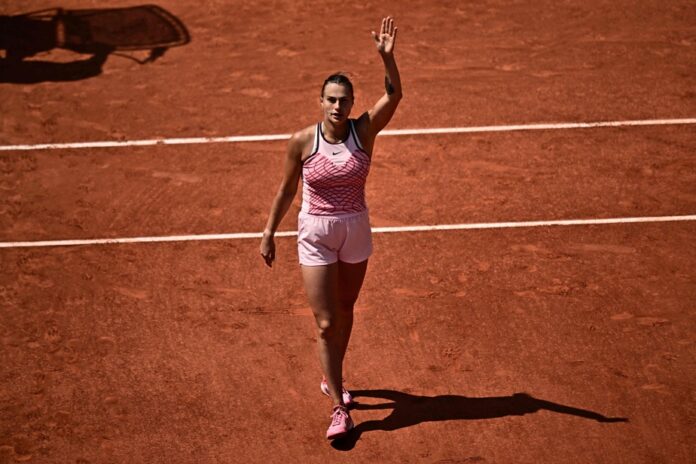(Paris) Belarusian Aryna Sabalenka, world No.2, took a firm stand against the war in Ukraine and the president of her country, an ally of Russia, after qualifying for the Roland-Garros semi-finals on Tuesday.
After evading the normally compulsory exercise of the press conference after her two previous matches, with the agreement of the Paris tournament, Sabalenka went there this time after her victory 6-4, 6-4 against the Ukrainian Elina Svitolina, a new match with a political dimension.
The 25-year-old Belarusian, who could become world No.1 at the end of the Paris fortnight, did not avoid political questions, and this time answered them. Without mincing words. “I don’t support war, which means I don’t support Lukashenko right now,” Sabalenka asserted for the first time.
“I don’t support war. I don’t want my country to be involved in a conflict. You know what my position is […] I don’t support this war,” she said. But “I don’t want sports mixed up in politics, because I’m just a 25-year-old tennis player. I just want to be a tennis player. »
Sabalenka’s decision not to come to a press conference after his previous two matches, on the grounds of preserving his “own sanity” and “well-being”, followed his appearance in front of the press after his second round. In a tense exchange, a Ukrainian journalist had summoned her to explain her links with Mr. Lukashenko.
“We played a lot of Fed Cup games in Belarus, and he was with us, he was taking pictures of us. Nothing bad was happening in Belarus, Russia or Ukraine back then,” she said on Tuesday.
Sabalenka has met Mr. Lukashenko on multiple occasions in the past. As of 2018, they meet one-on-one. At the request of the young player, says the state agency Belta.
On December 31, 2020, after a year marked by the crushing of pro-democracy protests in Belarus, Sabalenka participates in Minsk in a toast with Mr. Lukashenko for the New Year, along with other figures supporting the regime.
At the same time, according to the Belta agency, she signed an open letter, like 3,000 other Belarusian sportsmen, against the creation of a “Union of Free Sportsmen of Belarus” supporting the political opposition.
Until then, Sabalenka had never really spoken in her own name, but in a more general way. “No Russian or Belarusian athlete supports the war. Why do you have to say this stuff loud and clear? It’s obvious, like 1 1 = 2″, she said, for example, after her first-round match against another Ukrainian, Marta Kostyuk.
Against Svitolina, Sabalenka played a new match with a political dimension on Tuesday afternoon. At the end of the game, when the world No.2 placed her hands on the net, Svitolina did not come to shake her hand, as Ukrainian players now do when they face Russian and Belarusian players. , and went straight back to his chair.
Asked if this attitude of Sabalenka had added fuel to the fire, Svitolina replied: “I think so, unfortunately. »
“My first reaction was like, ‘What are you doing? Because I made my position clear,” added the Ukrainian, back in the Grand Slam quarter-finals less than eight months after giving birth to her first child last October, a baby girl from her union with Gaël Monfils, named Skaï.
For a place in the final, Sabalenka will face the Czech Karolina Muchova (43rd) on Thursday, victorious 7-5, 6-2 from the Russian Anastasia Pavlyuchenkova earlier in the day.
For Muchova, this will be her second major semi-final after the one played (and lost) at the 2021 Australian Open.















